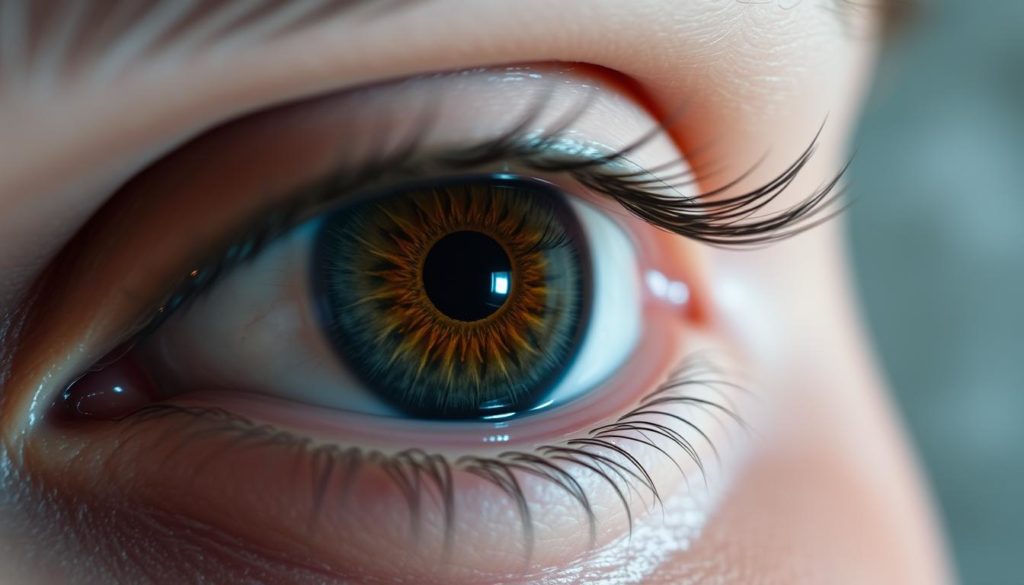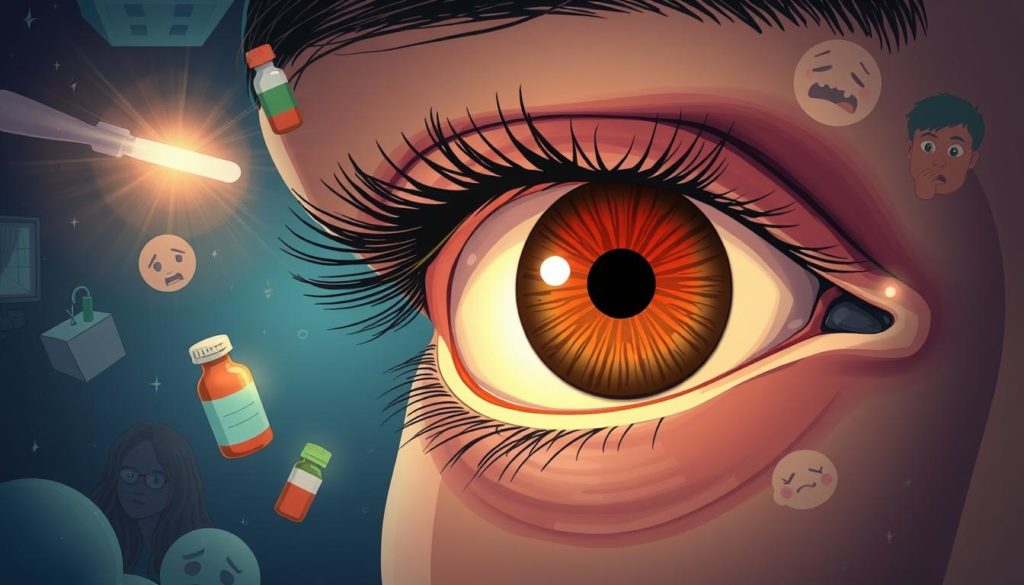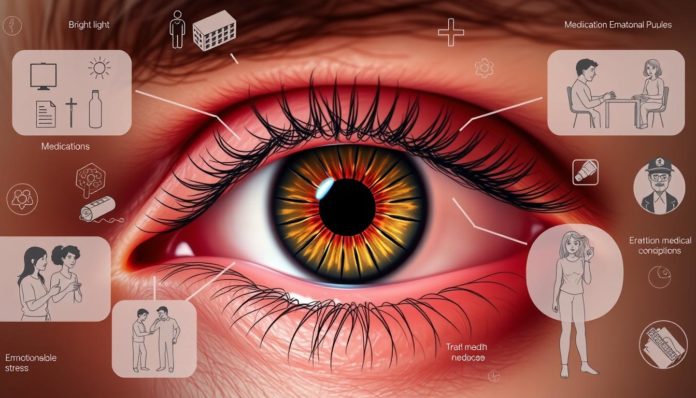“The eye sees only what the mind is prepared to comprehend.” – Robertson Davies
Robertson Davies’ quote is perfect for understanding enlarged pupils, or mydriasis. Pupil size increase comes from many surprising factors. This guide will explore both common and unexpected causes of pupil dilation.
We’ll look into the causes of enlarged pupils in detail. We’ll cover natural reactions, environmental factors, medical conditions, and emotional responses. Get ready to learn about the many reasons why pupil size changes.
Understanding Pupil Dilation: Basics You Should Know
Pupil dilation shows how our eyes react to different things. It’s the widening of the pupils. Let’s explore what makes pupils larger and how it happens.

What is Pupil Dilation?
Pupil dilation is when the pupils get bigger. It’s controlled by our autonomic nervous system. This system manages many body functions automatically.
In low light, our pupils get bigger to let more light in. This helps us see better in the dark. But in bright light, they get smaller to block out too much light.
How Does Pupil Size Change?
Two muscles in the iris control pupil size. The sphincter pupillae makes the pupil smaller in light. The dilator pupillae makes it bigger in dark.
Things like emotions, medicines, and more can also change pupil size. For example, feeling excited, scared, or attracted can make the pupils bigger.
| Factor | Effect on Pupil Size |
|---|---|
| Light | Constriction in bright light, dilation in low light |
| Emotions | Dilation due to excitement, fear, attraction |
| Medications | Various prescriptions can cause dilation |
Knowing about pupil dilation helps us understand our body’s responses. It also shows its importance in neurology and psychology.
Common Causes of Enlarged Pupils
Enlarged pupils, or mydriasis, can come from many causes. Knowing these can help tell if it’s just a normal reaction or if you need to see a doctor. Natural and environmental factors greatly affect how big our pupils are.
Natural Reactions
One big reason for enlarged pupils is how our body reacts to light. In dark places, our pupils get bigger to let in more light. In bright places, they get smaller to protect our eyes. Also, emotional states like excitement or fear can make our pupils bigger because of hormones and neurotransmitters.
Environmental Factors
Things outside of us can also make our pupils bigger. Being in a dark room or being near certain chemicals can make our pupils bigger. Drinking caffeine or alcohol can also make our pupils bigger because it stimulates our nervous system.
- Changes in lighting
- Emotional responses
- Substance intake (caffeine, alcohol)
- Exposure to chemicals

The mix of natural and environmental factors makes understanding enlarged pupils complex. Knowing these can help us tell if it’s okay or if we should worry about our health.
Medical Causes Behind Enlarged Pupils
Enlarged pupils can be a sign of serious health issues. It’s important to recognize these signs to get medical help quickly.
Injury or Trauma
Eye injuries or trauma are major reasons for dilated pupils. This includes both visible and internal injuries from accidents or sports. Such damage can cause changes in pupil size, sometimes showing a serious issue like a concussion.
If dilated pupils happen after an injury, get medical help right away. Watch for other signs like headaches, dizziness, or vision problems. These can mean a bigger issue.
Neurological Conditions
Neurological conditions are also a big reason for dilated pupils. Diseases like brain tumors, strokes, or aneurysms can affect pupil function. Look out for symptoms like loss of motor function, speech issues, or severe headaches. Seeing a doctor is key.
Knowing about the link between dilated pupils and serious neurological conditions can save lives. Regular health checks and watching for changes in pupil size and response can help catch problems early.
| Medical Cause | Related Symptoms | Importance of Medical Attention |
|---|---|---|
| Injury or Trauma | Dizziness, headache, vision changes | Immediate attention needed to rule out severe damage |
| Neurological Conditions | Speech difficulties, motor function loss, severe headache | Necessary to identify and manage potential life-threatening issues |
Medications That Can Cause Pupil Enlargement
Many things can make your pupils bigger, but some medicines are the main culprits. These drugs affect the nervous system, changing how big your pupils are. Knowing which medicines can do this helps you deal with it better.
Here are some medicines that can make your pupils bigger:
- Antidepressants
- Antihistamines
- Decongestants
- Antipsychotics
- Muscle relaxants
- Stimulants
These medicines can make your pupils bigger by messing with the chemicals in your brain. When these chemicals get out of balance, your pupils can get bigger.
Let’s look at how these medicines cause mydriasis:
| Medication Category | Common Drugs | Interaction with Nervous System |
|---|---|---|
| Antidepressants | SSRIs (e.g., Prozac), MAOIs (e.g., Nardil) | Affects serotonin levels, influencing pupil size |
| Antihistamines | Diphenhydramine (Benadryl), Loratadine (Claritin) | Blocks histamine receptors, causing pupil dilation |
| Decongestants | Pseudoephedrine (Sudafed) | Stimulates adrenergic receptors, leading to mydriasis |
| Antipsychotics | Risperidone (Risperdal), Olanzapine (Zyprexa) | Interacts with dopamine pathways, affecting pupil size |
| Muscle relaxants | Cyclobenzaprine (Flexeril) | Impacts norepinephrine, contributing to pupil enlargement |
| Stimulants | Adderall, Ritalin | Increases levels of norepinephrine and dopamine, dilating the pupils |
Knowing why medicines can make your pupils bigger helps you manage it better. It’s a common side effect, but always talk to your doctor if you notice changes in your pupils because of medicine.
Recreational Drugs and Pupil Dilation
Recreational drugs can cause pupil dilation, leading to mydriasis. Knowing how these substances affect us helps us understand their health impacts.
Specific Drugs That Influence Pupil Size
Some drugs are known for changing pupil size. These include:
- Cocaine: It makes pupils dilate because of its stimulating effects.
- MDMA (Ecstasy): This party drug often causes pupils to dilate.
- LSD: A strong hallucinogen, LSD makes pupils dilate a lot.
- Marijuana: It can cause mild pupil dilation, though it’s less severe.
Short-term vs. Long-term Effects
It’s important to know the immediate and lasting effects of these drugs. Short-term effects might include dilated pupils, vision changes, and light sensitivity. These usually go away once the drug’s effect fades.
But, long-term use of drugs like MDMA and cocaine can cause serious problems. These include lasting pupil dilation, nerve damage, and vision issues. Knowing these risks shows why we should be careful with recreational drugs.
Emotional and Psychological Triggers
The link between our emotions and physical responses is shown by dilated pupils. Knowing how emotions affect pupil size helps us see the mind-body connection. Let’s look at two main emotional triggers for enlarged pupils.
Stress and Anxiety
Stress or anxiety triggers the body’s fight-or-flight response. This releases adrenaline, making dilated pupils as the body gets ready to react. The dilation lets more light in, improving vision briefly. Yet, ongoing stress can cause pupils to stay big.
Excitement and Attraction
Excitement and attraction can also make dilated pupils. Meeting someone you’re attracted to releases dopamine, a pleasure chemical. This makes your pupils bigger, helping you focus on the attraction. It shows how emotions affect our body.
Knowing these emotional and psychological triggers is key to understanding enlarged pupils. Emotions deeply affect our body, showing the amazing connection between our minds and bodies.
Causes of Enlarged Pupils in Children
It’s important for parents and doctors to know why kids’ pupils get big. Kids can have mydriasis for many reasons, some different from adults. Let’s explore these reasons:
Diseases: Kids with brain tumors, meningitis, or other brain problems might have big pupils. If you think this, get them to a doctor fast.
Congenital Conditions: Some kids are born with issues that make their pupils stay big. Conditions like congenital aniridia or Horner’s syndrome can cause this.
Medications: Some medicines for kids, like antihistamines or ADHD drugs, can make their pupils big. Talk to your kid’s doctor about these side effects.
Trauma: A hit to the head or eye can also make a kid’s pupils big. Even small accidents can hurt a lot and need a doctor’s check.
“Sudden changes in pupil size in children should always be assessed by a healthcare professional to rule out serious conditions.”
| Cause | Description | Action Required |
|---|---|---|
| Diseases | Includes neurological disorders like meningitis and brain tumors | Immediate medical attention |
| Congenital Conditions | Conditions present at birth affecting the nervous system | Regular monitoring and specialist consultation |
| Medications | Side effects from drugs like antihistamines and ADHD medications | Consult prescribing physician |
| Trauma | Head or eye injuries | Medical evaluation post-incident |
Impact of Lighting Conditions on Pupil Size
The size of our pupils changes a lot based on the light around us. Whether we’re outside in the sun or reading by a lamp, our eyes adjust to see better in different lights. This shows how our bodies can adapt and stay healthy.
Bright vs. Low Light
In bright light, our pupils get smaller, a process called miosis. This helps protect our eyes from too much light. On the other hand, in dim light, our pupils get bigger, or dilate, to let in more light. This helps us see better when it’s dark.
How Eyes Adjust
The size of our pupils changes thanks to the iris’s muscles. When it’s bright, the muscles make the pupil smaller. In dim light, the muscles make it bigger to let in more light. This shows how our eyes work hard to help us see well, no matter the light.
FAQ
What is Pupil Dilation?
Pupil dilation, or mydriasis, is when the pupils get bigger. This can happen for many reasons. These include changes in light, emotional responses, or the effects of certain drugs.
How Does Pupil Size Change?
Pupil size changes with light. In bright light, they get smaller to protect the eyes. In dim light, they get bigger to let in more light. The iris muscles control these changes.
What are some Natural Reactions that Cause Enlarged Pupils?
Natural reactions like excitement, fear, or attraction can make pupils bigger. They also get bigger in dim light to help see better.
Which Environmental Factors Contribute to Pupil Enlargement?
Environmental factors like changes in light, chemicals, and sudden changes can make pupils bigger.
How Can Injury or Trauma Affect Pupil Size?
Eye or head injuries can damage the nerves controlling the iris. This can cause pupils to stay big. Such injuries need quick medical help.
What Neurological Conditions Could Cause Dilated Pupils?
Conditions like stroke, brain tumors, or other disorders can cause big pupils. These conditions affect the nerves controlling the iris.
Which Medications are Known to Cause Pupil Enlargement?
Some medications, like antidepressants, antihistamines, and eye drops, can make pupils bigger. They affect the nervous system and iris muscle regulation.
How Do Recreational Drugs Influence Pupil Size?
Drugs like cocaine, amphetamines, and hallucinogens can make pupils very big. They change how the nervous system works, affecting pupil responses.
What are the Differences Between Short-term and Long-term Effects of Drugs on Pupil Size?
Short-term effects might be just a quick dilation. Long-term effects can lead to permanent changes in pupil size, depending on the drug and how often it’s used.
How do Stress and Anxiety Affect Pupil Dilation?
Stress and anxiety can make pupils bigger by releasing adrenaline. This helps improve vision, making it easier to react to threats.
Can Excitement and Attraction Cause Pupils to Dilate?
Yes, excitement or attraction can make pupils bigger. The body’s nervous system reacts to positive stimuli by increasing pupil size.
What are the Causes of Enlarged Pupils in Children?
In kids, big pupils can be due to normal growth, medication reactions, or illnesses. Congenital conditions can also affect pupil size.
How do Bright vs. Low Light Conditions Affect Pupil Size?
In bright light, pupils get smaller to prevent damage. In dim light, they get bigger to let in more light and improve vision.
How Does the Eye Adjust to Different Lighting Conditions?
The eye adjusts to light changes through the iris muscles. This process, called the pupillary light reflex, ensures the right amount of light enters the eye for clear vision.


